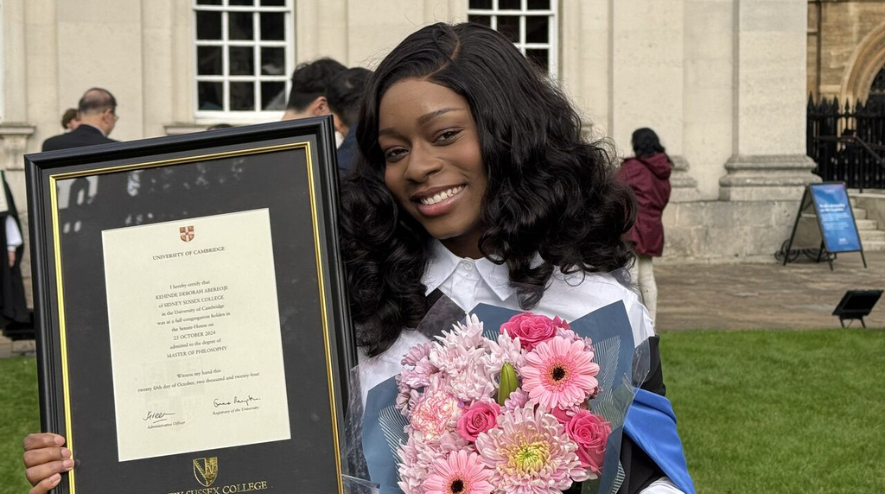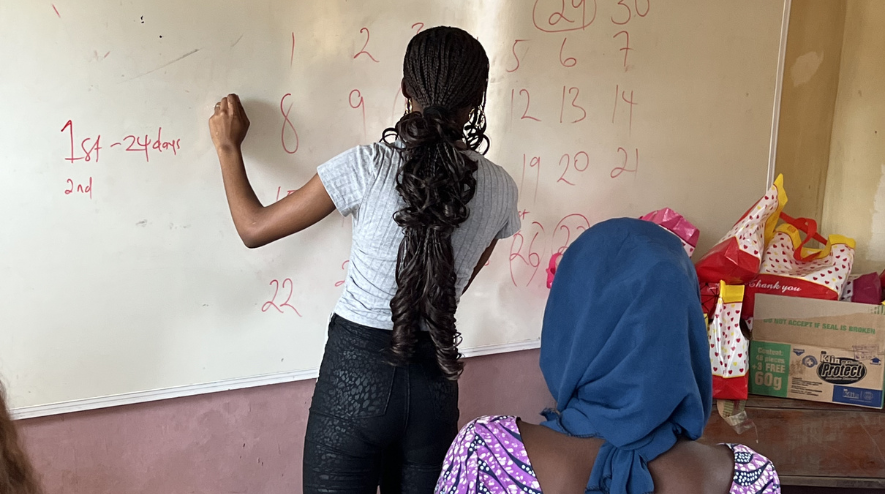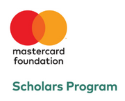
Submitted by Iain Fossey on Mon, 03/02/2025 - 15:50
Kehinde Abereoje found her sense of purpose at the age of 14.
Growing up in Nigeria’s capital, Abuja, she saw an endless stream of people entering the city’s Internally Displaced Persons (IDP) camps, forced to leave their homes and flee from terrorism and violence.
One day, keen to help, Kehinde took books and essential supplies to the camp near her home. She remembers being deeply shocked that girls her age lacked access to the basic items, and opportunities, that she took for granted.
Two years later in 2018, she co-founded the Purple Pact Initiative (purple representing the fight for gender equality) with her twin brother Taiwo, using education and mentorship to help women and girls overcome barriers that can stop them excelling.
Since then, life has been a whirlwind for Kehinde. Alongside overseeing the Initiative (Purple Pact has now reached more than 10,000 women and girls), she’s completed a BSc in Public Health at Babcock University in Ogun State, Nigeria, and a Master’s in Population Health Sciences here in Cambridge as a Mastercard Foundation Scholar. And last year she received the Diana Award* which recognises outstanding young people working to create positive social change.
We speak to Kehinde about her journey so far, how her time in Cambridge has changed her outlook, and what’s next.
What was the catalyst for starting the Purple Pact Initiative at such a young age?
It all started in 2016 when my brother and I, along with a couple of our classmates from Community Secondary School Asokoro (CSSA) in Abuja, went to an Internally Displaced Persons (IDP) camp near where we lived.
We wanted to take books to the people in the camp and our mentor, who was helping us, suggested we take some additional materials too including sanitary pads. I remember being shocked by the women’s reaction to receiving the pads – it clearly meant so much. It really hit me that there were people who couldn’t afford even the most basic things.
From that day I felt that something was off but wasn’t sure how best I could help. My brother and I asked ourselves what we could do and decided we wanted to start advocating for women and for girls. But most of all, we wanted to tackle some of the little things that have the biggest consequences.
For example, when we found out that people couldn’t afford sanitary pads, we tried to look at the implications of that. It could seem like a small issue as there are many things people can’t afford, but this is different. Periods don’t stop for poverty. They don’t stop for wars or terrorism. They don’t stop for anything.
If a period stops a girl from going to school, it affects their educational opportunities and they can fall behind. If they can’t go to work, it affects their economic opportunities. Just giving someone access to pads can literally make all the difference. It’s these seemingly small barriers that stop women progressing that we try to remove.
We focus on empowering girls through education, mentorship and sexual health awareness. We want to provide them with the knowledge and resources they need to make informed decisions and fulfil their potential.
Kehinde leading a Purple Pact workshop in Nigeria
The Initiative has now reached more than 10,000 women and girls across Nigeria. What do you think sets it apart?
In the early days we saw that some organisations working with people in underserved communities use them to be the face of their interventions, for their posters, but don’t really sit with them to understand what they need.
That’s what we do differently. We try to co-create our programmes with the people in those communities and do what they actually need. We encourage the women to share their ideas, then we design interventions with them in their communities. They usually lead the projects, all I do is help develop the idea.
These leaders have the freedom to deliver the project as they see fit. We don’t have a one-size-fits-all approach. We now have eight programme heads for different parts of the country who organise projects, supported by more than 200 volunteers.
You were one of the recipients of The Diana Award in 2024, which recognises ‘outstanding young people selflessly creating positive social change’. How did that feel?
It felt exciting. Seeing that other people recognise and value the work we’re doing is rewarding. The award is for everyone at Purple Pact.
But it’s also a reminder that we have a lot of work to do. People shouldn’t have to fight for and receive a pat on the back for fighting for gender equality. It’s something that’s just meant to happen, that’s meant to be.
I don’t want the next generation to have to fight for it.
How do you think being part of the Mastercard Foundation Scholars Program will benefit you going forwards? What are the main lessons you’ve taken away from your time in Cambridge?
Being surrounded by the best minds around the world was inspiring. What I valued the most was seeing other Africans doing amazing things that I know will change the world. It just proved to me that I can do anything I set my mind to do.
I found my course’s robust research focus to be helpful, especially the module on changing behaviour. Our programmes at Purple Pact aim at changing behaviour to enable people to make better and more informed choices. I look forward to applying all this knowledge to future programmes.
Aside from my course, the leadership module led by Cambridge Institute for Sustainability Leadership (CISL) has changed how I see leadership. It taught me about more sustainable leadership. It emphasised collaboration and how love is central to successful collaboration. It’s love for the common goal that drives good leadership and collaboration. It was also nice setting goals and having practical workshops during the sessions to help us envision the kind of leaders we hope to be.
The Mastercard Foundation Scholars Program at the University of Cambridge enables students to develop their entrepreneurship skills through training from King’s Entrepreneurship Lab. How has this helped you?
It changed a lot for me. It showed me that you can help more people by charging some people. This was such an eye-opener!
It helped me think of another venture I’m starting up this year – establishing Nigeria’s first company producing reusable period pants. The money we make will be used to fund Purple Pact’s activities. We’re in the process of registering the company right now and I’m hoping we’ll start operations by March. Everything’s going to be locally sourced from Nigeria and sold in Nigeria. I’m hoping that in the longer-term, we can export to other African countries, even the UK, the US.
Learning more about social ventures and hearing from successful entrepreneurs also helped me understand how establishing our company can help tackle other challenges. For example, we can help reduce the waste we have from people needing to dispose of plastic and single use sanitary pads. We can help tackle period poverty as people don’t have to pay a lot of money for pads. And we can create jobs for women who will be directly involved in the company.
Finally, looking back over the last six years, can you think of any moments that have made you particularly proud and driven you to achieve your goals?
Yes, there was one at the last Sexual Health Education and Enlightenment Programme I attended. We spoke about menstrual health and menstrual hygiene but also about sex, consent and about understanding your body. I was asking the participants what they had learnt afterwards and one of the girls said she had learnt that she can ask her mum for help. That she doesn’t have to be ashamed.
It made me think of the kinds of conversations girls will be having when they go back home and how this is a way to break the cycle of stigma. If girls feel confident enough to ask their mums and discuss things with their friends, then their friends can discuss things with their friends…
Just think of the number of people we can impact by touching just one life!
*The Diana Award was established in 1999 in memory of the late Diana, Princess of Wales and her belief that young people have the power to change the world.



